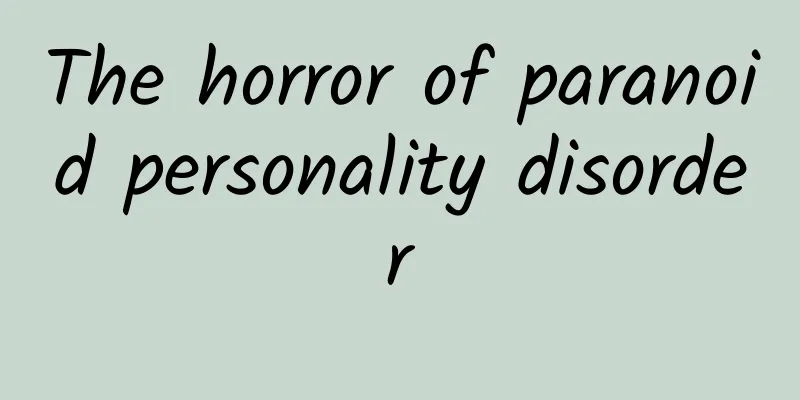The horror of paranoid personality disorder

|
In our lives, we always encounter some paranoid people who insist on doing what they want to do and implement it according to their own ideas regardless of whether it is right or wrong. When we encounter such people, we can only feel helpless. Paranoia is human nature, the only difference is the degree. But there is a type of person who has this kind of personality, which is medically known as paranoid personality disorder. This type of person is often more scary. Let’s take a look at the horror of paranoid personality disorder. Paranoid personality disorder is a psychiatric disorder that begins in adolescence and lasts throughout life. Generally, mental disorders are inseparable from the living environment. Most patients with paranoid personality disorder are generally male, and they often occur in single-parent families due to lack of fatherly or motherly love. It is also due to the environment in which one lives, such as frequent blows in life and limited ability to withstand, which makes it easy to go to extremes. Also, factors such as setting too high standards for oneself and low self-esteem can affect a person's psychology. And mental disorders occur. This type of patients are unwilling or rarely seek medical treatment, thinking it is unnecessary. However, patients with this paranoid personality disorder often live a very painful life and find it difficult to free themselves, and they become trapped in extreme thoughts and cannot extricate themselves. They often think that they are right, are obsessed with one point of view, are very stubborn, sensitive, and suspicious. Distrust of others. Note: Paranoid personality disorder is also known as delusional personality disorder. Be stubborn in holding a point of view and over-rationalize it. Even if the point of view is wrong, you will ignore other people's advice and will not take on other people's criticism. People with paranoid personality disorder can easily go to extremes. Treatment 1. Drug treatment When formulating a drug treatment plan, the patient should be checked for comorbidities. Combined treatment is adopted for patients with comorbid anxiety and depression. Antidepressants and anti-anxiety drugs can be given for symptomatic treatment. It is recommended to take the medicine under the guidance of a doctor. 2. Psychotherapy for paranoid personality disorder The basic principle of psychotherapy is that the counselor uses the principles of psychology to explain the client's symptoms to help the patient understand and comprehend his or her own psychological dynamics and condition, especially repressed desires, hidden motives, or unresolved complexes. The scope of treatment should include inner spirit, interpersonal relationships, and adaptation to reality. The ultimate goal is to promote the maturity of one's own character. (1) Cognitive improvement method: Since patients do not trust others, are sensitive and suspicious, and will not accept any well-intentioned advice, we must first establish a trusting relationship with them, communicate emotions on the basis of mutual trust, and fully introduce to them the nature, characteristics, harmfulness and correction methods of their own personality disorders, so that they can have a correct and objective understanding of themselves, and consciously and voluntarily generate the desire to change their own personality defects. This is a prerequisite for further psychotherapy. Homework is an essential part of cognitive therapy. In the final counseling phase, homework should serve prognosis and relapse prevention. (2) Friendship training encourages them to actively engage in friendship activities, learn to trust others in the process of making friends, and eliminate insecurity. The principles and essentials of friendship training are: ① Meet each other sincerely and make friends with sincerity. ②Try to take the initiative to provide all kinds of help to your close friends during interactions. ③Pay attention to the “psychological mutual respect principle” in making friends. (3) Self-therapy: People with paranoid personality like to go to extremes, which is related to the irrational ideas in their minds. Therefore, to change paranoid behavior, patients with paranoid personality must first analyze their own irrational ideas. (4) Hostility Correction Training: Patients with paranoid personality disorder tend to be hostile and distrustful of others and their surroundings. The following training methods can help overcome hostility and confrontation. ① Always remind yourself not to fall into the vortex of "hostility". ② You must understand the basic principle that only by respecting others can you gain the respect of others. ③Learn to smile to everyone you know. ④ Learn to be tolerant and patient in life. (5) Sandplay therapy counseling can help them integrate their personality and restore their mental health. Analyzing the patient's subconscious mind helps counselors develop effective counseling plans for patients. |
<<: Paranoid personality disorder
>>: Emotionally unstable personality disorder
Recommend
The efficacy and function of golden ear grass
Many people don’t know much about Aconitum carmic...
Causes of indented toenails
The condition of sunken toenails may be caused by...
Bloating and farting during menstruation
Symptoms such as bloating and flatulence during m...
What are the factors that cause mild hypoxic-ischemic encephalopathy in children?
Hypoxic-ischemic encephalopathy in babies is a ne...
What medicine is good for clearing the liver and improving eyesight
According to the theory of traditional Chinese me...
Symptoms and treatment of emphysema
Emphysema refers to a pathological condition in w...
What are the herbs that replenish qi and blood?
Many female friends will experience endocrine dis...
What causes itchy soles of feet?
Many people are concerned about what causes itchy...
How to make delicious pumpkin stewed chicken
In today's society, most people have begun to...
What are the benefits of eating wild kudzu root powder?
Wild kudzu root powder is a milky white powdery s...
Composition of Gu Chong Tang
Stir-fried Atractylodes macrocephala and Poria co...
What is frigidity?
Sexual apathy means lack of sexual desire. To put...
Can Tianma stewed goose eggs cure headaches?
Gastrodia elata is a relatively common Chinese me...
How to completely cure hypothyroidism
As people pay more and more attention to the qual...
What are the medicinal values of Daidai fruit?
The origin of the daidai flower is Zhejiang Provi...









